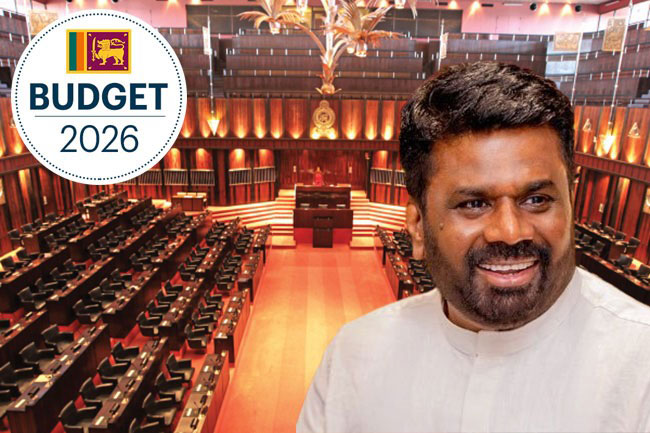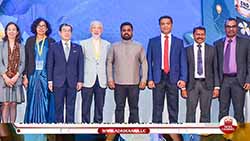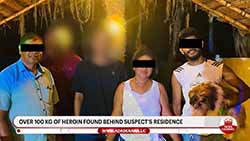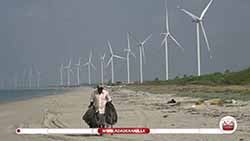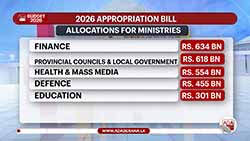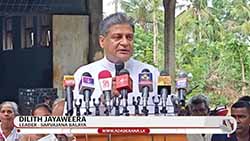LIVE UPDATES: 2026 Budget Speech
November 7, 2025 01:38 pm
- It is proposed to allocate an additional Rs. 1,000 million, supplementary to the provisions already set aside, for the implementation of a comprehensive road safety programme.
This programme aims to enhance road safety infrastructure through the integration of safety strategies into road design and the improvement of unsafe road sections.
- For overall road development in the year 2026, Rs. 342,000 million or Rs. 342 billion has been allocated.
This includes the Central Expressway Phase 1, Phase 3, Katugastota-Galagedara Road Section, Kurunegala-Dambulla Proposed Expressway, Ruwanpura Expressway (First Section of Kahathuduwa to Ingiriya) and the feasibility study on the construction of the link between the Port Access Elevated Highway and the Marine Drive Extension (Phase II).
- Rs. 67,200 million has been allocated in this budget for the creation of an efficient and sustainable passenger transportation system, which is a key priority of the current government, he said.
Among them, the main projects to be implemented include the following:
➤ To strengthen the public transportation sector, 600 buses are scheduled to be added to the long-distance service fleet by the Sri Lanka Transport Board (SLTB). Rs. 3,600 million has been allocated for the initial implementation of this project.
➤ Furthermore, Rs. 2,062 million has been allocated for the next year to replace the worn-out engine units of 307 belonging to the Sri Lanka Transport Board (SLTB).
➤ We would also like to mention that Rs. 790 million has been allocated for the procurement of necessary new tools, machinery, and equipment required for the depots and workshops of the Sri Lanka Transport Board (SLTB).
➤ With the objective of enhancing the efficiency and passenger-friendliness of the railway service, Rs. 3,300 million has been allocated for the initial activities related to the procurement of five new Diesel Multiple Units (DMUs) for the Sri Lanka Railways Department.
Furthermore, preliminary work on the digitalization of the railway service, including the introduction of an electronic ticketing system for rail passengers, has already commenced.
➤ Further, it has been observed that private sector service providers have reduced their bus operations on certain routes across the island due to insufficient revenue. As a result, passengers in these rural areas experience significant hardships.
Therefore, it is proposed to formulate an appropriate programme to systematically identify such routes and ensure the provision of a sustainable transport service. As an interim measure, an additional allocation of Rs. 2,000 million is proposed for the year 2026.
- He said new water supply projects are being initiated and the ongoing projects are being completed expeditiously.
Rs. 85,700 million has been allocated for the implementation of drinking water supply projects as well as community water supply projects covering districts such as Gampaha, Kalutara, Anuradhapura, Kandy, Jaffna, Kilinochchi and Kurunegala.
Furthermore, steps are being taken to implement the necessary infrastructure facilities for drinking water supply in collaboration with the private sector, he said.
- Rs. 1,000 million has been allocated to meet the urban drinking water demand in Colombo District by constructing a new water supply system in Ambatale, to update and provide new water supply to Kolonnawa and Nugegoda-Jubilee post, and to construct a new water project in Lunugamvehera in the Hambantota District to supply drinking water to people affected by water scarcity and to support the upliftment of production-oriented industries.
- President said immediate solutions are required for recurring flood threats in cities such as Colombo, Gampaha, Galle, Ampara, Mannar, and Puttalam.
As a short and medium-term solution, it is proposed to prepare an integrated plan in collaboration with the Department of Irrigation, Urban Development Authority, Sri Lanka Land Development Corporation, and Local Government Institutions, and to implement it within the medium-term budgetary framework.
In this budget, Rs. 250 million has been allocated for the preparation and implementation of this plan, he said.
- Due to the absence of a proper flood management plan, people in Ratnapura, Kalutara, and Matara have faced severe difficulties, he said, adding that there is a need to conduct a formal feasibility study on flood management of the Gin and Kalu rivers.
“We expect through this proposed programme to provide additional water to the Walawe basin and also to provide a suitable solution to the existing flood problem in Ratnapura and Kalutara districts. It is proposed to allocate Rs. 500 million for conducting these studies.”
- Rs. 8,350 million allocated for the improvement and rehabilitation of small tanks, canals and sluice systems. Under this programme, it is expected to renovate 650 tanks and nearly 350 kilometers of canals.
- Rs. 91,700 million allocated to uplift irrigation, the President said. “We expect to achieve the Government’s priority objectives such as increasing domestic agricultural production, regional development, and job creation by resuming temporarily suspended projects.”
Also, Rs. 5,000 million allocated to expedite the Lower Malwathu Oya Multipurpose Development Project.
Rs. 6,500 million allocated for the restoration of other canal systems, including urgent initiation of restoration work of the sluice (Sorowwa) of Senanayake Samudraya, as well as restoration of Gal Oya, Rajanganaya, Huruluwewa, and Minneriya reservoirs.
- Rs. 100 million allocated to conduct a detailed study on the economic benefits that can be achieved through marine and coastal fisheries, marine aquaculture, ecotourism, diving-related activities, marine biotechnology and development of seabed resources in the Exclusive Economic Zone (EEZ).
- To ensure the safety of fishermen, it is proposed to allocate Rs. 100 million to provide life-saving equipment for fishermen.
“Many countries in the world are using modern technology to easily identify fishing spots. Providing that technology to our fishermen will lead to the advancement of the industry,” he said.
- Rs. 300 million allocated for the renovation, rehabilitation, and upgrading of existing infrastructure facilities at selected fishery harbours, including Beruwala, Ambalangoda, Kudawella, and Nilwella.
Further, in addition to the provisions already allocated for further improvement of essential infrastructure facilities in fishery harbours, it is proposed to allocate an additional Rs. 1,000 million.
- To achieve the expected export targets by achieving the medium-term productivity goals of the coconut sector, it is proposed to allocate Rs. 2,500 million to implement a structured programme to motivate coconut growers who own less than 5 acres out of the estimated 447,000 acres currently under coconut cultivation.
As a long-term strategy to increase coconut production, the government has allocated Rs. 600 million for the further expansion of coconut cultivation in the already established Northern Coconut Triangle based on the recommendations of the Coconut Research Institute.
- President said that for Sri Lanka to become self-sufficient in milk, approximately 1,200 million liters of milk must be produced annually and that the National Dairy Production Programme is designed to reach the target of meeting 75 percent of the domestic milk requirement by 2030.
For this programme, it is expected to implement a programme to improve the breeding, nutrition and health of dairy cattle by organizing farmers based on each Veterinary Division. For this purpose, we propose to organize farmers and increase local milk production, based on the potential of Veterinary Divisions.
We propose to allocate Rs. 1,000 million for the preliminary work including the feasibility study of this project under the “Small and Medium sized Livestock Development Programme,” he added.
- He proposed to provide Rs. 1,000 million to strengthen the mechanism related to the service provided by Sathosa and to improve storage facilities to minimize price fluctuations in food crops including onions, potatoes and maize.
- Rs. 1,800 million allocated to promote sports culture among country’s children and youth by expanding opportunities for sports facilities. President proposed to allocate an additional Rs. 800 million for this purpose.
Rs. 1,163 million allocated to provide facilities for players to participate in international sports competitions, second-tier sports pools, international sports tournaments, national sports competitions, and high-caliber sports teams to provide facilities for about 4,000 participating athletes.
Under the development of sports infrastructure, Rs. 225 million has been allocated in this year’s budget for the development of sports complexes in the Mannar and Vavuniya districts, and Rs. 150 million for the completion of the Kalmunai Sports Stadium.
Subsequently, Rs. 150 million has been allocated for the development of sports complexes in the Northern and Eastern provinces, he said.
- He proposed to allocate an additional Rs. 50 million in addition to the existing allocations to promote drama, performing arts and literature as an area of cultural enrichment.
- Approval granted to procure 294 essential vehicles and modern communication equipment to enhance the efficiency of the Department of Wildlife Conservation.
An additional Rs. 300 million already allocated to complete the construction of all electric fences in all identified, essential areas. This includes fences that are already completed but dilapidated, broken down, partially constructed, or planned for construction.
It is also proposed to provide special training to 5,000 Civil Security Service officers and attach them permanently to the Department of Wildlife to monitor elephant enclosures and minimize elephant-human conflict.
Rs. 375 million allocated to provide food allowances and fuel allowances for equipment maintenance to Civil Security officers assigned to monitor and maintain electric fences.
Rs. 80 million allocated for pasture and water source management activities to ensure the provision of food and water for elephants.
He proposes to allocate an additional provision of Rs. 1,000 million in addition to the provisions allocated to the Department of Wildlife Conservation to complete the construction of electric fences and other related tasks to control elephant-human conflict.
He proposed to allocate Rs. 10 million for research to find long-term, research-based solutions beyond the construction of electric fences to reduce these elephant-human conflicts.
- In appreciation of the contribution made by Sri Lankans abroad to the development of the country, the government is introducing a housing loan scheme at concessional interest for migrant workers, he said.
He said it is proposed to implement it using the funds of the Sri Lanka Bureau of Foreign Employment according to the interest reimbursement method.
Similarly, a contributory pension scheme for foreign workers is being introduced, he said, adding that the Bureau of Foreign Employment will carry out the necessary work to implement the basic work quickly and within the year 2026.
Rs. 2,000 million will be allocated from the funds of the Bureau of Foreign Employment in the initial phase of these programmes, he said.
- This budget has allocated Rs. 240 million to uplift self-employment, household industries, etc., carried out by women entrepreneurs across the island at the Divisional Secretariat level, the President said.
Under this, he said that efforts will be made to provide assistance to women entrepreneurs to start new businesses and strengthen self-employment activities. In addition to this, an additional Rs. 200 million is proposed to be allocated for programmes aimed at the welfare of women.
- President said the construction of previously started and halted roads and bridges will be reactivated, and major junctions will be widened. Accordingly, Rs. 24,000 million is allocated for rural roads and Rs. 2,500 million for rural bridges, he said.
- The President proposed to increase the current minimum daily wage of estate workers from Rs. 1,350 to Rs. 1,550 from January 2026.
Furthermore, in addition to the salary of Rs. 1,550, it is proposed to pay Rs. 200 as a daily attendance incentive by the government. It is proposed to allocate Rs. 5,000 million for this purpose, he said.
- In order to implement the integrated rural development programme island-wide under the National Campaign for Eradicating Poverty, he proposes to allocate Rs. 20,750 million in addition to the provisions of Rs. 4,250 million allocated for the Praja Shakthi programme, increasing the total allocation to Rs. 25,000 million.
- The President also proposed to allocate Rs. 1,000 million to relocate the Dambulla and Deniyaya regional hospitals to more accessible, secure, more spacious and suitable locations.
- Rs. 570 million has been allocated to conduct the Demographic and Health Survey (DHS), which is supposed to be conducted every five years, and has not been conducted since 2016.
- He proposed to allocate Rs. 250 million to provide a monthly allowance of Rs. 10,000 each to low-income thalassemia patients based on medical recommendations, in lieu of the amount paid by the Provincial Councils.
- Rs. 200 million has been allocated to begin the initial work required to establish a 16-storey National Heart Unit at the Colombo National Hospital with more space and modern equipment at a cost of Rs. 12,000 million.
- Secondary health services are provided through 82 Base Hospitals. The facilities of most of these hospitals have not been developed recently.
Provisions have been made to commence the first year of a five-year programme of Rs. 31,000 million to improve the quality of secondary health services by developing these hospitals, the President added.
- President proposes to establish “Arogya” centers covering between 5,000 - 10,000 people with the aim of increasing people’s access to services aimed at primary health and well-being.
He proposed to allocate Rs. 1,500 million to implement this concept as a pilot project in 2026 in locations such as maternity and children’s clinics, Medical Officer of Health (MOH) offices, etc., which currently provide various health services and have the necessary infrastructure.
Considering its results, this programme will be implemented throughout the country over the next 03 years in collaboration with Provincial Councils.
- Rs. 1,500 million will be allocated from the budget for the construction of hostels in selected universities, especially in the South-East, Jaffna (Kilinochchi), Vavuniya, Eastern and Sabaragamuwa universities.
Provisions have also been made in this year’s budget for the renovation of hostels that have not been properly maintained due to the financial crisis in the country.
- The President said that although the number of students enrolled in universities has increased to 43,000 over the past decade, the lack of adequate facilities for them has created many serious problems. Therefore, Rs. 2,500 million has been allocated to improve common facilities such as hostels, canteens and common learning areas for students, he said.
Rs. 11,000 million has been allocated for the development of medical faculties at Sabaragamuwa, Moratuwa, Ruhuna, Uva Wellassa and Eastern Universities to sort out the issues caused by nonexistence of professorial units and laboratory facilities required for quality medical education, even though new medical faculties has been established past years.
In addition, Rs. 11,500 million has been allocated for improving facilities and research activities at universities and higher educational institutions.
- Mahapola and bursary allowances provided for university students increased by Rs. 2,500 in first budget. In 2026 also, we propose to increase the monthly Mahapola and bursary allowances for university students by Rs. 2,500 to keep pace with the rising cost of living.
Accordingly, the monthly Mahapola allowance will be increased to Rs. 10,000 and the bursary allowance will be increased to Rs. 9,000. subsequently, the “Nipunatha Sisu Diriya Allowance” will also be increased by Rs. 2,500.
- With the aim of sending children with disabilities to school, it is proposed to allocate Rs. 50 million from this year’s budget to provide a monthly allowance of Rs. 5,000 per disabled child from low-income families, based on medical recommendations.
- With the aim of reducing the cost of books, equipment and stationery for a family to educate their children and ensuring that every child receives the stationery they need for their studies, the President said the government will continue the Rs. 6,000 stationery allowance provided to students in 2025 for the year 2026 as well. For this purpose, Rs. 9,000 million has been allocated under the Aswesuma Programme.
- He proposed to allocate Rs. 1,000 million from the budget to provide accessibility and sanitation facilities to public places such as Divisional Secretariats, Railway Stations, Bus Stands, Courts, Police Stations and other places for the disabled community.
It has been officially announced that 3 percent of the government service has been allocated for the disabled community, but it is not being implemented properly. Therefore, efforts will be made to recruit that 3 percent for government service in all future public service recruitments, Dissanayake said.
With the aim of encouraging private employers and increasing employment, if persons with disabilities who are able to work are employed in the private sector, we propose to pay a wage subsidy of 50 percent of the employees’ salary, subject to a maximum of Rs. 15,000, for up to 24 months. It is proposed to allocate Rs. 500 million for this purpose, he said.
- He said that although the capacity of the existing prisons is sufficient for only 11,000 inmates, there are currently over 35,000 inmates in those prisons.
- He proposed to allocate Rs. 2,000 million to meet the urgent need for efficient prison operations, ie. the expeditious implementation of projects such as the expansion of identified prisons and relocation to recommended locations, improvement of prison infrastructure, and referral of prisoners to community programmes and detention in open prisons, in accordance with the existing legal framework.
- It is proposed to establish 10 voluntary rehabilitation centers under the Rehabilitation Bureau in 10 locations including Polonnaruwa, Welikanda-Senapura, to rehabilitate people addicted to toxic drugs.
- President said it is proposed to allocate Rs. 1,500 million to implement drug control programmes covering all sectors that are the basis for taking forward the vision of “A Nation United National Operation”.
- We introduced the Clean Sri Lanka programme as a programme that everyone can agree on, regardless of party affiliation, in order to make this country a standardized and beautiful country, the president said, adding that Rs. 6,500 million has been allocated for that programme.
- The draft Research and Development Policy of the Government has been finalized, the President said.
- He said the National Research, Development and Commercialization Institute and the National Council on Research and Development will be established as a centralized administrative institution to oversee the entire process, and the relevant bill will be presented to parliament in 2026.
- A provision of Rs. 1,200 million has been allocated for the national programme to bring research to commercialization, he said.
- He also proposed to establish “Virtual Special Economic Zones” through the Board of Investment to practically operate in Sri Lanka, generating exports and employments.
- To attract investment, a fund will be established in 2026 to accelerate the growth of the start-ups ecosystem. An initial government grant of Rs. 1,500 million (USD 5 million) has been allocated under the Ministry of Digital Economy expenditure head for the establishment of the fund.
- “It is proposed to suspend the tax applicable to new towers constructed under this digital technology expansion programme for a period of 5 years,” he said.
- Dissanayake said that to accelerate the spread of digital technology, a simpler and faster unique approval process will be established for the construction of digital infrastructure facilities such as communication towers.
- Rs. 750 million has been allocated to foster innovation, provision of funds for selected artificial intelligence projects, scholarships for foreign training and development of local language datasets, and provide artificial intelligence and cloud facilities for research and development purposes in universities and schools, the President said.
- To encourage these investments, an attractive environment should be created in this sector for foreign and local investors through financial incentives, green energy use incentives, low-cost electricity at the initial stage, and concessional provision of necessary land. As an initial step, it is proposed to allocate Rs. 500 million for 2026, he said.
- “Among them, it is necessary to strengthen data security, confidentiality, privacy, and digital governance legal systems and ensure investor confidence. We are already doing that.”
- He said Sri Lanka has a high potential to emerge as a regional hub for setting up data centers and that there are many crucial steps that need to be taken in attracting investments in data centers.
- Further, to promote payments using the QR code system, he proposed to provide the necessary provisions through the expenditure head of the Ministry of Digital Economy to enable QR code payments worth less than Rs. 5,000 to be made free of charge.
- Accordingly, effective from January 1, 2026, all service fees for electronic payments to Government institutions are permitted to be waived, he said.
- Rs. 1,000 million to be allocated to cover the cost of these transactions, to upgrade systems and educate the public. A further Rs. 500 million is to be allocated to provide the necessary facilities and to carry out promotional campaigns.
- All payment transactions with the government will be carried out through an online system in the future, and as a start to encourage this, the president proposed not to charge service fees when making payments to state institutions.
- The first Digital ID will be issued in third quarter of 2026, no matter what external forces attempt to prevent it through conspiracies, the President assured.
- Rs. 25,500 million to be invested in 2026 to develop the digital economy, and a Digital Economy Council to be established.
- A special task force will be appointed to review the management and use of government-owned lands.
- To increase the efficiency of state businesses, a new Public Commercial Enterprise Management Act will be introduced. It will be presented to the parliament in the first half of 2026.
- The President said that the Strategic Development Projects Act and the Colombo Port City Economic Commission Act will be amended to provide tax relief with transparency and under strict guidelines.
- He said the government has approved projects with a total value of USD 1.3 billion within the proximity of the Colombo Port City.
- He added that investor-friendly policies will be implemented, and a new State Enterprise Management Act will be presented to the Parliament next year.
- The President said that USD 823 million in Foreign Direct Investments (FDI) had been received up to September 2025.
- A digital system to declare assets will be established by March 2026, the President says.
- President Dissanayake said that a code of ethics will be introduced for judicial officers in 2026 and an experts’ committee will be appointed for this purpose.- Corruption is a tax imposed on the poor and a shackle hampering the country’s development, he said.
- The President said that the government will introduce the e-procurement system very soon in order to prevent corruption and malpractice further.
- He said that SriLankan Airlines’ debt, which has now increased to USD 210 million, still needs to be restructured and that the government expects to restructure that before December this year.
- He said that global rating agencies, including Fitch Rating, Moody’s and S&P, have raised Sri Lanka’s credit ratings gradually, due to the progress achieved.
- The President said the debt restructuring task has been almost completed and that the trust of local and foreign investors has been further strengthened.
- He stated that by the end of the year 2025, they will be able to reach the country’s economic situation which existed before the economic crisis.
- The country’s debt could be reduced to a percentage of 87% by 2030, the President said.
- He added that they are expecting the state revenue to reach 16% of the GDP this year, after two decades.
- We are expecting the country’s official reserve assets to reach USD 7 billion by the end of this year, he said.
- We will do our utmost to maintain inflation at a level below 5%, the President said, adding that the situation has now turned positive.
- The President said that the incumbent government was able to reestablish state finances, economic and social stability within a short period of just one year through reforms.
- President Dissanayake said that the government has been able to re-establish its fiscal position and achieve macroeconomic stabilisation within a year by controlling inflation and building reserves.
- “It gives me immense pleasure to deliver our second national budget,” said President Dissanayake, commencing his budget speech.
President Anura Kumara Dissanayake, who arrived in Parliament, commenced delivering the 2026 Budget Speech a short while ago.
The Cabinet of Ministers granted approval for the Budget 2026 to be presented to the Parliament during the special Cabinet meeting held this morning (07).
Accordingly, the Second Reading of the Appropriation Bill for the fiscal year 2026, the country’s 80th Budget Speech, was delivered by President Dissanayake, in his capacity as the Minister of Finance.
This is the National People’s Power (NPP) government’s second budget proposal.
Accordingly, the Budget Debate on the Appropriation Bill is scheduled to be held from tomorrow (08) to December 05.
The second reading vote on the 2026 Budget is scheduled to be held on November 14 at 6.00 p.m.
The Committee Stage debate will be held for 17 days from November 15 to December 05.
The third reading vote is scheduled to be held at 6.00 p.m. on December 05.
The Budget Debate is scheduled to be held every day during the Budget Period, except for public holidays and Sundays, according to the Department of Communication of Parliament.



